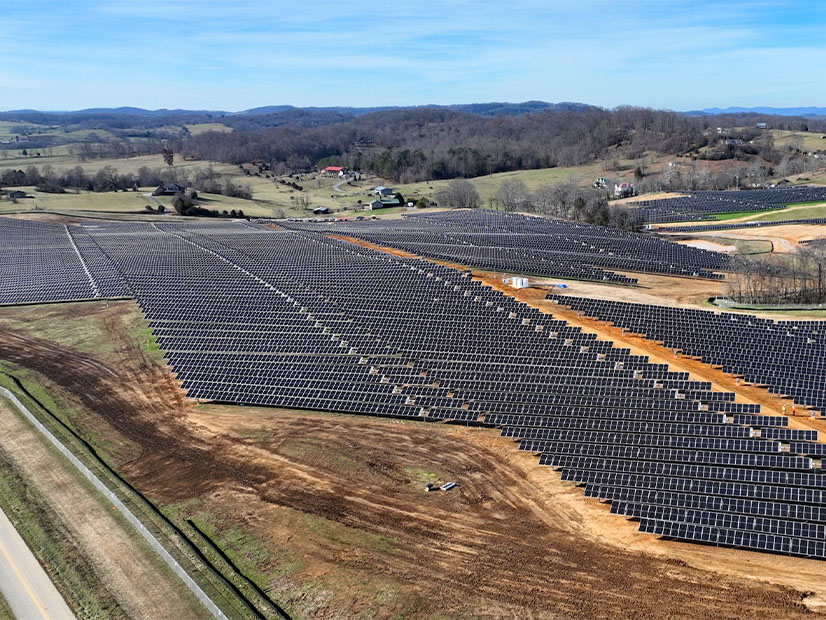The U.S. House of Representatives Committee on Energy and Commerce last week put the Tennessee Valley Authority on notice that it’s concerned about the federal utility’s rates and clean energy goals.
The committee on Thursday sent TVA a letter posing 16 questions on electricity affordability and renewable energy investment. Representatives said they were troubled that TVA wasn’t making enough progress on emissions reduction and that its prices are no longer affordable.
“Specifically, we are concerned that Tennessee Valley residents pay too much for electricity, which particularly impacts low-income households in Tennessee,” the committee wrote. “The committee is also concerned that TVA is interfering with the adoption of renewable energy by its commercial and residential customers and, while it is making progress on decarbonization, it must do more this decade.”
TVA ratepayers’ bills exceed the national average, the committee said. It pointed out that Memphis’ low-income residents have among the highest energy burdens in the country while TVA has scaled back its energy efficiency programs in recent years.
The committee said its questioning serves to “understand the extent to which the disparity between TVA’s low rates and its high customer bills is driven by the organization’s decision to deprioritize energy efficiency and impose fixed fees that keep rates low but cost ratepayers money.”
The committee asked whether TVA would commit to more energy-efficiency measures and requested information on the utility’s current and future energy-efficiency savings and on its local power companies’ energy efficiency programs. It also asked TVA to explain its “underinvestment in solar and wind resources” and detail its wholesale contracts with qualifying facilities under the Public Utility Regulatory Policies Act.
TVA must also furnish information on its rate changes over the last five years and its reasoning behind its 2018 decision to introduce fixed charges to its local power companies.
The committee also said it wants to know “whether TVA plans to update its decarbonization goals and next integrated resource plan (IRP) to comply with President Biden’s executive order and to reflect TVA’s statutory role as a national leader in technology and environmental stewardship.”
It asked what TVA is doing to reduce its natural gas reliance and whether the utility would retire its entire coal fleet earlier than its stated goal of 2035. The committee requested the status of the environmental impact statements for the planned retirements of TVA’s Cumberland and Kingston coal plants.
The Biden administration has a goal of zero emissions in the electricity sector by 2035. TVA has a target to lower its carbon emissions 80% from 2005 levels by 2035; it plans to achieve net-zero carbon emissions by 2050. Clean-energy proponents have criticized TVA’s goals as sluggish. (See Green Groups Pressure TVA on Open Meetings, Decarbonization.)
Finally, the committee asked the utility to explain its participation in the defunct Utility Air Regulatory Group, a lobbying organization that opposed environmental standards. (See TVA Sued Over Contributions to Trade Groups.) The Center for Biological Diversity sued the TVA for passing on membership dues to ratepayers, leading to a FERC notice of inquiry over the appropriateness of recovering trade association dues in utility rates. (See FERC Questions Ratepayer Funding of Trade Association Dues.)
Reacting to the letter, TVA pointed that it has already reduced emissions 63% from 2005 levels and currently supplies almost 60% of its power from carbon-free resources.
TVA spokesperson Ashton Davies said the utility is “actively pursuing emerging technologies, from carbon capture to advanced nuclear, while supporting national clean energy initiatives, such as a robust electric vehicle charging infrastructure.”
Davies also said TVA’s rates are lower than 80% of the nation’s largest utilities.
“Even with TVA’s low energy costs, we recognize the challenge of high-energy burden in our region. TVA is in partnership with 153 local power companies and other organizations to help address the root-causes of this issue, including the need to weatherize and implement energy efficiency measures in buildings and housing,” Davies said in a statement to RTO Insider.
TVA has until Feb. 2 to respond in writing to the committee’s inquiry.
Southern Alliance for Clean Energy Executive Director Stephen A. Smith lauded the committee’s action. In a statement, he welcomed the “renewed Congressional oversight of this unregulated federal monopoly catering to the elite at the expense of the masses.”
“TVA has lost its way in serving the salt of the Earth people of the Tennessee Valley,” Smith said. “With a board of directors that condones the tasteless acts of cutting efficiency programs to help people lower their bills and blocking customer-owned clean energy, while simultaneously awarding excessive salaries and a jet-setting lifestyle to their executives, TVA has lost touch with its core service mission.”
Smith added that the “privileged rubberstamp of the TVA board structure is failing our people.”




